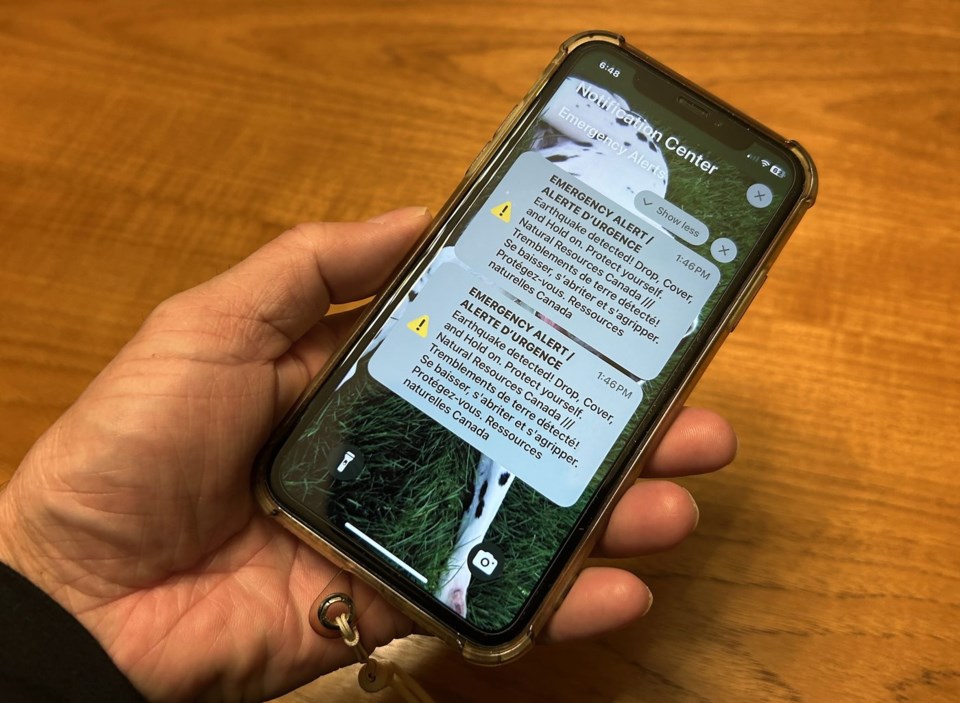Some residents in southwestern British Columbia are sounding the alarm after reports of sporadic and inconsistent alerts from the national early warning system during the 4.7-magnitude earthquake on Friday.
Complaints first surfaced on social media after the quake centred 24 kilometres north-northeast of Sechelt, B.C., on the Sunshine Coast struck Friday afternoon, with several residents saying they didn't receive an alert from the Earthquake Early Warning system.
Among them was Campbell River, B.C., teacher and first aid attendant Nat Raedwulf Pogue, who was at her workplace at a local school when the quake struck and only received confirmation of the earthquake after a colleague actively searched for information online.
"It was enough where my desk was shaking, my walls were shaking," Raedwulf Pogue said of the severity of the shaking. "I came into contact with maybe five or six colleagues immediately afterwards, and none of them had confirmation an earthquake had happened.
"I don't know of anyone in my immediate vicinity who got an alert."
Other reports on social media platforms such as X and Facebook showed people receiving alerts 15 to 22 minutes after the shaking, while others reported receiving no warning at all where — in some cases — spouses in the same household did receive the alert.
Natural Resources Canada seismologist Alison Bird said Saturday that the alerts sent from the ministry's Earthquake Early Warning system "are being evaluated."
But she noted that the timing of when people would receive a warning depends on both their distance from the earthquake and how they receive the alerts.
Bird said the alerts on Friday were only issued in an area around the quake's epicentre — located on the Sunshine Coast — where "strong shaking" was expected, but some people outside the zone may have also received those warnings.
"Some people outside the area for EEW alerting may have received the alert because their device was able to receive a signal from a cell tower that is within the EEW area," Bird said in a written response. "Everyone within the area of strong shaking … should have received the alert, however."
Bird also said there may be confusion over the federally sent alerts specific to earthquakes and the provincial system — which notifies residents of "significant events" that may also include wildfires and other disasters.
B.C. legislative assembly member Brennan Day said he was in Courtenay, B.C., on Vancouver Island on Friday, and he did not know there was an earthquake until he received a text from his father in nearby Dove Creek who felt the shaking but got no warning.
"My wife was at a client's house — and we're on the same (mobile service) plan — she got an alert about two or three seconds before the earthquake actually started, which is fantastic," Day said. "But I was 10 kilometres away didn't get an alert.
"A lot of people I know in the (Comox) Valley … are now commenting it's completely hit-or-miss, whether they got an alert or not. So I think there's some a serious look that needs to be taken at the emergency alert system, because if it's done geographically, everybody on certain cellphone towers should have gotten that alert, and that just didn't happen."
Day, a B.C. Conservative member representing Courtenay-Comox in the provincial legislature, said the region was lucky the warning system "got a trial run" before a larger earthquake struck, but added the sporadic warnings were "absolutely a huge concern."
"At the end of the day, if we have a massive earthquake, it's going to be the matter of life and death whether we can respond — get under a table, get yourself to a safer position — in advance," he said.
"(The province) has an emergency preparedness plan, but it needs to work … seconds matter."
Friday's earthquake has been followed by a number of aftershocks between 1.0 and 2.0 in strength, and there has been no report of damage from the quake that occurred at 1:26 p.m. local time at a depth of about one kilometre.
Raedwulf Pogue, a learning support teacher who works with students with disabilities, said it is especially critical for warning systems to function properly in cases similar to hers, since some have already expressed uneasiness after the shaking Friday.
"I did have a few students who were quite anxious about what happened and just needed confirmation — that yes, it happened, because they really weren't sure — and also that they were OK," she said.
"We have students with mobility disability, so we would actually need more time to get them into a safe location. And we have students with developmental disabilities where even if their mobility isn't impacted by their disability, they would need more assurance and more heads-up about what's happening.
"The more time we have to provide them with what they need to move to a safer spot would prevent, hopefully, injury and limit the danger."
This report by The Canadian Press was first published Feb. 22, 2025.
Chuck Chiang, The Canadian Press

